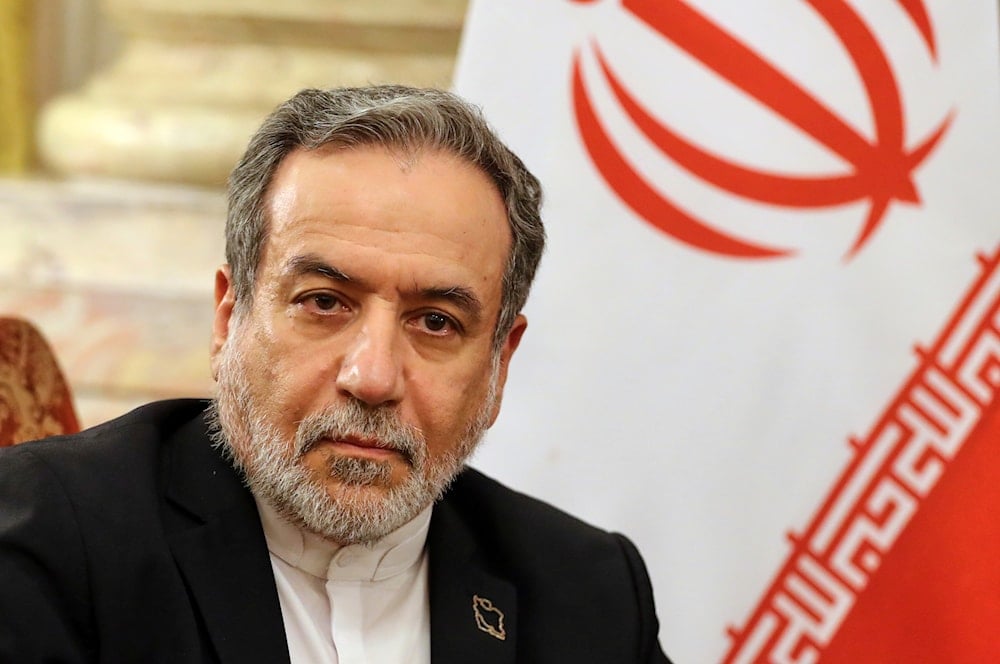New IAEA deal forbids inspections without authorization: Iranian FM
Iran’s FM warns that activating the snapback mechanism amid ongoing E3 talks would prompt retaliation, as separate cooperation with the IAEA continues.
-

Iranian Foreign Minister Abbas Araghchi looks on during a meeting with Director General of the International Atomic Energy Agency (IAEA) Rafael Grossi and Egyptian Foreign Minister Badr Abdelatty at Tahrir Palace in Cairo, Tuesday, Sept. 9, 2025. (AP)
Negotiations between Iran and the E3 (France, Germany, and the UK) are still ongoing but are proceeding on a separate track from the talks currently being held with the International Atomic Energy Agency, announced Iranian Foreign Minister Abbas Araghchi.
Araghchi further explained that Iran, Russia, and China all agree that the European Troika does not have the right to activate the snapback mechanism, describing the conditions set by the E3 for extending the deadline to activate it as both "unacceptable" and "unwise".
The Iranian foreign minister also confirmed that the new agreement between Iran and the International Atomic Energy Agency establishes a new framework for their cooperation, with the agency formally acknowledging, as part of this accord, that the attacks on Iranian nuclear facilities were illegal.
He also stressed that the agreement will not permit the inspection of facilities that were attacked and that IAEA inspectors cannot access any nuclear site without authorization from Iran's Supreme National Security Council.
The agreement has taken all of Iran's security concerns into account and will remain in force provided no hostile action is taken against the country's interests, including the activation of the trigger mechanism, according to Araghchi, who further clarified on behalf of Iran's Foreign Ministry that there is no room for differing interpretations of the Cairo Agreement, as its text is explicitly clear.
Snapback mechanism activation will prompt retaliation
Activating the trigger mechanism would be a grave miscalculation, Araghchi warned, stating that the Europeans would gain no advantage from such a move. He confirmed that Iran would undoubtedly respond if the mechanism were activated, noting that the country's Supreme National Security Council holds the authority to determine the nature of that response.
Regarding potential responses, Araghchi stated that "withdrawing from the Nuclear Non-Proliferation Treaty (NPT) remains one of the options under consideration," while clarifying that Tehran is discussing all possible courses of action, some of which might be more favorable than this particular choice.
He also considered that extending the trigger mechanism's deadline would provide an additional opportunity for diplomacy to resolve the outstanding disagreements.
On Qatar, Hezbollah
On the subject of the aggression against Qatar, Araghchi argued that it revealed "Israel's" true colors to the entire region and proved that it is the primary threat to regional security.
The Iranian FM noted that "halting Israeli crimes requires collective action by Islamic nations," adding that "what Palestine needs is not statements of condemnation."
In a separate context, Araghchi stated that "the issue of Hezbollah's weapons is a Lebanese matter that must be resolved by the Lebanese people themselves."
He also pointed out that Hezbollah is an inseparable part of Lebanon's political structure, and while clearly expressing his country's support for the group, he emphasized that this does not equate to interfering in Lebanon's internal affairs.
Araghchi added, "We have assured Lebanese officials that Israel wants the countries of the region to be weak, even divided, and that they must remain vigilant."
Iran will protect its rights in accordance with NPT
In a phone call with UN Secretary-General Antonio Guterres, Araghchi affirmed Iran's determination to protect the rights and interests of its people in accordance with the Nuclear Non-Proliferation Treaty.
Araghchi stressed the necessity for the United Nations and all nations to take a clear and firm stance in condemning the aggression against peaceful nuclear facilities in Iran.
He noted that Iran considers the E3's stance as deeply irresponsible for both turning a blind eye to the US-Israeli aggression and simultaneously threatening to snapback sanctions, warning that this contradictory approach will only make the situation more complicated.
Araghchi asserted that by choosing to engage in constructive dialogue with the IAEA, Tehran has taken a responsible path to find a workable understanding on fulfilling its safeguard obligations in the wake of the attacks on its nuclear facilities. In this context, he called on the European powers and UN Security Council members to acknowledge and appreciate this good-faith effort.

 4 Min Read
4 Min Read










